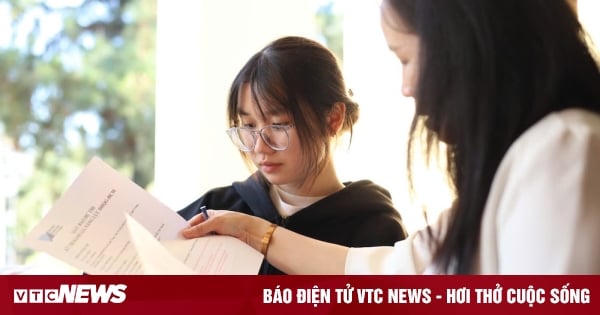In mid-October 2024, IELTS co-organizers announced data related to the IELTS exam globally in 2023 - 2024. Accordingly, for the Academic exam alone, the average IELTS score of Vietnamese people is 6.2, similar to 2022 and ranked 28th out of 39 countries that organize the IELTS exam. In terms of score ratio, 23% of candidates in Vietnam achieved an IELTS score of 7.0 or higher. Vietnam currently has about 20 people achieving IELTS 9.0.
X U NECESSARY TREND
Ms. TT, a parent whose child attends Tran Dai Nghia Secondary and High School in District 1, Ho Chi Minh City, said that many students in the school have IELTS scores of 7.5 and 8.0. She said: "In an 8th grade class, I know of 2 students who recently achieved IELTS 8.0, this score does not surprise other parents."

Candidates take a mock test with foreign experts at the IELTS festival held in March 2024
PHOTO: NGOC LONG
Mr. Truong Chan Sang, member of the Ho Chi Minh City English Teaching and Research Association, English teacher at Phan Chu Trinh Primary, Secondary and High School, Di An City, Binh Duong, said that in recent years, the IELTS scores of students have been increasing, this is an inevitable trend. This can be explained by many factors, such as the fact that students today have access to more abundant learning resources, from online courses, English learning applications, to the increasingly developed international learning environment. In addition, teachers have also improved teaching methods, focusing on developing all four skills of listening, speaking, reading, and writing, helping students improve their ability to use English comprehensively. In addition, students and parents' awareness of the importance of IELTS in opening up international study and career opportunities is also increasingly clear, motivating students to make more efforts to improve their scores.
Ms. Ha Dang Nhu Quynh, Academic Director at DOL English, PhD student at Reading University (UK), said that today's students have access to English earlier, with more and easier-to-find materials. IELTS is becoming more and more popular, along with the benefits of having an IELTS certificate when applying for university admission, so many students invest more money, effort and time in studying to achieve high scores. At the same time, the method of teaching and learning English is increasingly improved, instead of learning by rote and learning tricks, students switch to thinking and understanding the essence more, thereby improving their scores in a shorter time and developing all 4 language skills (listening, speaking, reading, writing) along with thinking.
Mr. Le Hoang Phong, founder of YOUREORG Education and Training Organization, said that the fact that students are achieving higher IELTS scores is not only the result of developments in education but also reflects profound changes in learning approaches and educational environments.
Students today grow up in a globalized environment, where English is not only a language but also a necessary tool to access knowledge and opportunities. Next is the shift in educational thinking. In the past, learning English was often heavy on grammar and translation, but now teaching methods focus on practicing skills and language reflexes. It can be said that modern education helps students learn in a practical, proactive and clearly oriented way, especially with exams like IELTS.

Ho Chi Minh City students in an IELTS class
PHOTO: NHAT THINH
STUDY TO USE, NOT TO TAKE EXAMS
Although the IELTS certificate can be a "passport" to study abroad, settle down, apply for admission..., educators believe that a high IELTS score is not everything. One of the major challenges today is that many students consider IELTS as a short-term "destination" to meet exam requirements, then forget to maintain their skills. This is not only wasteful but also reduces the real value of the English learning process.
PhD student Ha Dang Nhu Quynh frankly said: "If you only study English to get a score on the IELTS test, it is a waste. If a student does not maintain good English skills, it will be very difficult to communicate with foreign lecturers when studying abroad or further education, and it will be difficult to communicate with international partners when working. Therefore, students should study well in essence, not just learn tricks to cope with the exam. Students should choose a method that helps them to be good at nature and improve logical thinking to create advantages for themselves in work and further education in the future."
Mr. Le Hoang Phong emphasized: "IELTS is not the final goal but a tool. Students should ask themselves: After achieving IELTS 7.0, what will I do with this skill? Instead of stopping, continue to practice and apply English to larger goals such as research, international communication, or in-depth study in specialized fields."
Mr. Phong advised students to learn English to use, not just for exams. IELTS scores are proof of language ability, but the real value lies in whether you can turn it into a "key" to open doors in study, work and communication.
"Instead of considering IELTS as a ticket, students should see it as a tool to help build their future. Only when English becomes a part of life, will it truly bring sustainable value," Mr. Phong said.


![[Photo] Prime Minister Pham Minh Chinh meets with King Philippe of Belgium](https://vstatic.vietnam.vn/vietnam/resource/IMAGE/2025/4/1/be2f9ad3b17843b9b8f8dee6f2d227e7)
![[Photo] President Luong Cuong and King Philippe of Belgium visit Thang Long Imperial Citadel](https://vstatic.vietnam.vn/vietnam/resource/IMAGE/2025/4/1/cb080a6652f84a1291edc3d2ee50f631)
![[Photo] General Secretary To Lam receives King Philippe of Belgium](https://vstatic.vietnam.vn/vietnam/resource/IMAGE/2025/4/1/e5963137a0c9428dabb93bdb34b86d7c)
![[Photo] Close-up of Vietnam's sniffer dog team searching for earthquake victims in Myanmar](https://vstatic.vietnam.vn/vietnam/resource/IMAGE/2025/4/1/d4949a0510ba40af93a15359b5450df2)



























![[Photo] Myanmar's capital in disarray after the great earthquake](https://vstatic.vietnam.vn/vietnam/resource/IMAGE/2025/4/1/7719e43b61ba40f3ac17f5c3c1f03720)





























































Comment (0)